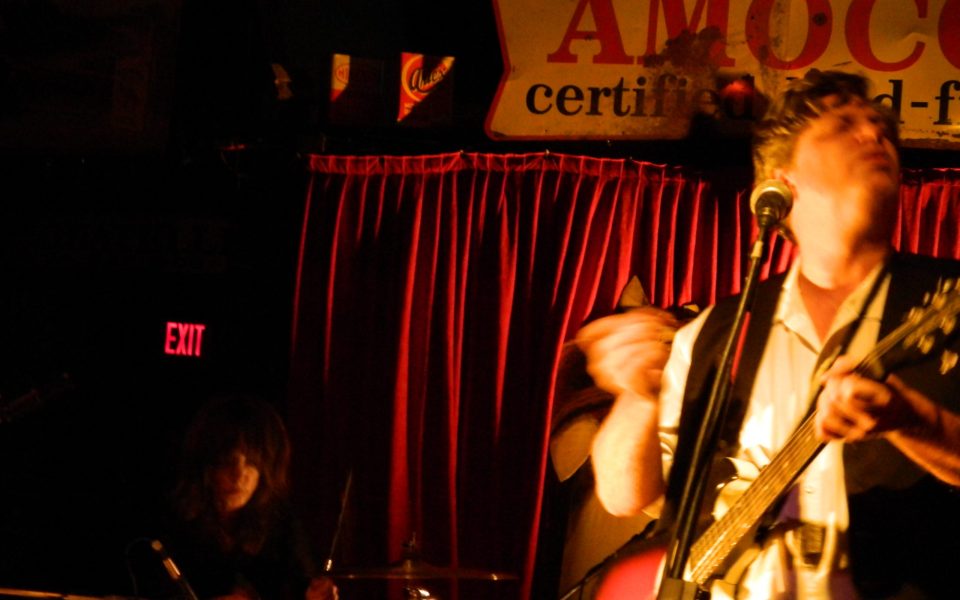by Jordan Green
Dexter Romweber leaned against the wall outside the Garage on Seventh Street in Winston-Salem as his sister, Sara, chatted with Mitch Easter, her former bandmate from the legendary 1980s jangle-pop duo Let’s Active.
While Easter has cemented his reputation as a sought-after producer at his Fidelitorium Recordings Studio in Kernersville, Dexter Romweber has forged his own inimitable path as an elder of sorts. For artists like Jack White, Romweber created the template for raw, virtuosic rock and roll with both emotional honesty and stylistic integrity. He also forged a link to the explosive wellspring of the music’s roots in the improbable fusion of hillbilly and R&B before it was revised in the successive waves of the British invasion, psychedelia, classic rock and synth-pop.
Dexter Romweber has been pursuing his singular vision as a crooner and rockabilly-inspired guitarist since his teenagehood in Carrboro in the mid-1980s, first with the Flat Duo Jets, as a solo act, briefly with the orchestra-sized New Romans and, over the course of three studio albums since 2009, with Sara on drums as the Dex Romweber Duo.
From the moment Chuck Falcon hit the first chord as the opening act on the bill headlined by the Dex Romweber Duo at the Garage on June 6, it was clear that this was the house that Dexter built.
While a drum-machine likely never figured in Romweber’s plans, the portability and raw passion of Falcon’s act certainly suggested a chain of influence. With bass and drum tracks performing capable service, Falcon played loud, raw electric guitar that shifted from mid-’60s garage to straight-ahead rock in the mold of the Runaways, with hints of glam. While stylistically distinct from Romweber’s oeuvre, the mustachioed Falcon’s amped-up romanticism provided a faint echo.
Making their fourth appearance at the Garage, the Ghost Wolves invert the formula established by Dexter Romweber and emulated by the White Stripes, with a female guitarist and singer in front of a male drummer.
Dressed in a white minidress with matching cowboy boots, Carley Wolf wasted no time whipping the crowd into a frenzy with her ferocious slide-guitar playing, while husband Jonny wailed and thundered on his kit.
The totality of Carley Wolf’s stage presence — stage leaps and girlish squeals — makes it easy to forget what an extraordinary guitar player she is. In volume, energy and brattiness, the Ghost Wolves’ music might be mistaken for female-front punk rock along the lines of Bikini Kill, except filtered through a Mississippi hill country blues sensibility.
As the night progressed, the room filled with Bettie Page bobs, flannel and tattoo shirtsleeves — evidence of both anticipation for Dexter Romweber and the Ghost Wolves’ waxing appeal. The latter act’s most recent album, Man, Woman, Beast, released on May 27, boasts no shortage of strong material.
Supporting their new album, Images 13, the Dex Romweber Duo took a deep dive into Dexter’s vast catalogue. A cover of the Rio Rockers’ 1958 side “Mexicali Baby” was a fitting kickoff for the set, displaying Dexter’s frenetic vocals drenched in melancholy, and the menacing and slightly off-kilter drumbeat.
The duo surged through a surf instrumental from the new record, and changed up with “Love Letters,” a ballad from 2009’s Ruins of Berlin in which Dexter’s baritone cracked with pathos.
In an era when guitarists typically rely on an array of pedals to access a catalogue of textures, it’s notable that Romweber relies only on the dexterity of his fingers and strumming technique to coax out an American songbook of styles.
The passion and precision of Dexter’s playing expands the vocabulary of rockabilly music beyond the bass slapping, hiccupping and jittering guitar that has made a caricature of the genre. The warble of his baritone curling into a snarl and turns of heartache and stoicism in his phrasing reveal him as a stylist at home in any genre.
Dexter’s rendition of “The Lonesome Road,” a tin-pan alley tune written in the 1920s in the style of an African-American folk song and later covered by Frank Sinatra and Sammy Davis Jr., provided further proof of his versatility.
And while much of Dexter’s work sounds like it’s postdated pre-1960, a cover of the Who’s “So Sad About Us” added a rare pop sparkle to the otherwise darkened corridors of his musical imagination.
Sara’s drumming moved nimbly in tandem with the eccentricities of Dexter’s playing, with a mambo beat here and gentle martial flourish there.
Typically a man of mystery, Dexter appeared to be in great spirits, displaying a wicked sense of humor.
“Are there enough porn palaces in Winston-Salem?” he asked at one point. “It doesn’t matter because I gave it up tonight.”
After roaring through “Roll On,” the lead track from Images 13, with exhilarating abandon and apparent control, Dexter lightly thumped his head against the wall in frustration. If there were any mistakes, no one in the audience appeared to notice.
“We’re only human, folks,” Dexter Romweber said. “No greater, no less.”
Join the First Amendment Society, a membership that goes directly to funding TCB‘s newsroom.
We believe that reporting can save the world.
The TCB First Amendment Society recognizes the vital role of a free, unfettered press with a bundling of local experiences designed to build community, and unique engagements with our newsroom that will help you understand, and shape, local journalism’s critical role in uplifting the people in our cities.
All revenue goes directly into the newsroom as reporters’ salaries and freelance commissions.





Leave a Reply